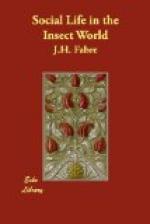To this example, hitherto unique, my continual researches in this direction permit me to-day to add three others which are fully as interesting. All three are members of the corporation of dung-beetles. I will relate their habits, but briefly, as in many respects their history is the same as that of the Sacred Scarabaeus, the Spanish Copris, and others.
The first example is the Sisyphus beetle (Sisyphus Schaefferi, Lin.), the smallest and most industrious of our pill-makers. It has no equal in lively agility, grotesque somersaults, and sudden tumbles down the impossible paths or over the impracticable obstacles to which its obstinacy is perpetually leading it. In allusion to these frantic gymnastics Latreille has given the insect the name of Sisyphus, after the celebrated inmate of the classic Hades. This unhappy spirit underwent terrible exertions in his efforts to heave to the top of a mountain an enormous rock, which always escaped him at the moment of attaining the summit, and rolled back to the foot of the slope. Begin again, poor Sisyphus, begin again, begin again always! Your torments will never cease until the rock is firmly placed upon the summit of the mountain.
I like this myth. It is, in a way, the history of many of us; not odious scoundrels worthy of eternal torments, but worthy and laborious folk, useful to their neighbours. One crime alone is theirs to expiate: the crime of poverty. Half a century or more ago, for my own part, I left many blood-stained tatters on the crags of the inhospitable mountain; I sweated, strained every nerve, exhausted my veins, spent without reckoning my reserves of energy, in order to carry upward and lodge in a place of security that crushing burden, my daily bread; and hardly was the load balanced but it once more slipped downwards, fell, and was engulfed. Begin again, poor Sisyphus; begin again, until your burden, falling for the last time, shall crush your head and set you free at length.
The Sisyphus of the naturalists knows nothing of these tribulations. Agile and lively, careless of slope or precipice, he trundles his load, which is sometimes food for himself, sometimes for his offspring. He is very rare hereabouts; I should never have succeeded in obtaining a sufficient number of specimens for my purpose but for an assistant whom I may opportunely present to the reader, for he will be mentioned again in these recitals.
This is my son, little Paul, aged seven. An assiduous companion of the chase, he knows better than any one of his age the secrets of the Cigale, the Cricket, and especially of the dung-beetle, his great delight. At a distance of twenty yards his clear sight distinguishes the refuse-tip of a beetle’s burrow from a chance lump of earth; his fine ear will catch the chirping of a grasshopper inaudible to me. He lends me his sight and hearing, and I in return make him free of my thoughts, which he welcomes attentively, raising his wide blue eyes questioningly to mine.




